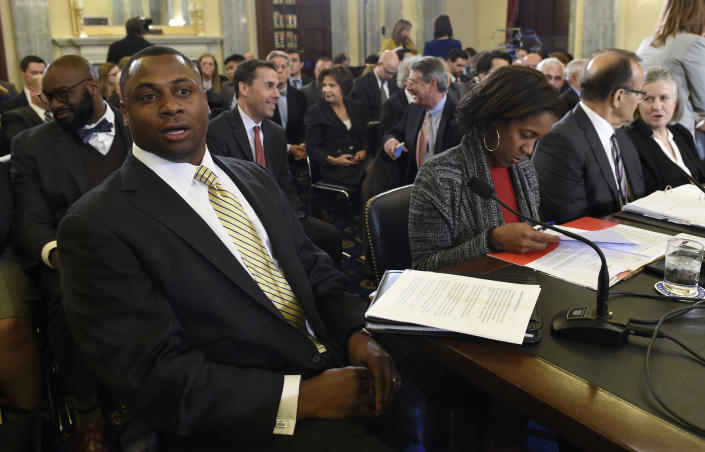Top NFL official: Goodell didn’t need to see second Ray Rice video
In a Senate hearing, officials from the four major sports leagues are grilled by politicians on their policies to prevent player domestic violence
Appearing before a congressional panel on Tuesday, NFL Executive Vice President Troy Vincent refused to answer one of the biggest questions in sports: whether NFL Commissioner Roger Goodell knew about the video of Baltimore Ravens player Ray Rice knocking out his then-fiancée in an Atlantic City hotel elevator before it was made public by a gossip website, TMZ, in September.
That question, and whether Goodell lied publicly about his knowledge of the video, is at the center of an ongoing investigation commissioned by the NFL and led by former FBI director Robert Mueller. Goodell had said in news interviews that he had not been aware of the existence of the video — or of what exactly had happened in the elevator — before it went public. But multiple reports have contradicted his assertion, and Janay Rice, who has since married the running back, told NBC News this week that her husband has “told the honest truth” to the NFL about what happened that night, and that she could not say the same about Goodell.
In a Senate Commerce Committee hearing Tuesday, Sen. John Thune, R-S.D., asked Vincent directly how the commissioner could not have known about the video from inside the elevator “at the time of the June 16 meeting with Ray Rice."
While Vincent did not answer that question directly, his response made plain the NFL’s current position on whether the league acted appropriately and on when it could have imposed a stricter punishment on Rice.
Vincent called Rice’s behavior “heartless, gutless [and] despicable,” before adding, “I don't think there was a need for a second video in order to impose the proper discipline.”
Rice had faced a two-game suspension after the release of an initial hotel security video that showed him dragging Janay out of the elevator. Women’s rights advocates had argued that the NFL did not need to see the second video in order to take more serious action against Rice, and Vincent's comments were the first indication that any league official agrees.

When asked how the NFL could encourage change from the team level up on the issue of domestic violence, Vincent later said that “everything was on the table,” including taking draft picks away from offending teams.
Senators used the hearing to grill representatives of the major four sports leagues and their players’ associations about what measures they are taking to curb domestic violence among athletes.
Senate Commerce Committee Chairman Jay Rockefeller (D-W.Va.) argued that the congressional panel has jurisdiction over the issue, thanks to the lucrative, permanent antitrust exemptions that the big four professional sports leagues enjoy, as well as the public financing deals the sports clubs receive to build stadiums in cities across the United States. But most of those financing packages come through municipal or state governments.
But beyond public shaming, Congress has few options to force the leagues to act. While it could work to remove or sunset the leagues’ antitrust exemptions or eliminate their nonprofit tax status, revoking these benefits would be extraordinarily challenging — especially because most of the major leagues have at least one club in Canada and could threaten to reorganize outside of the U.S. for financial reasons.


